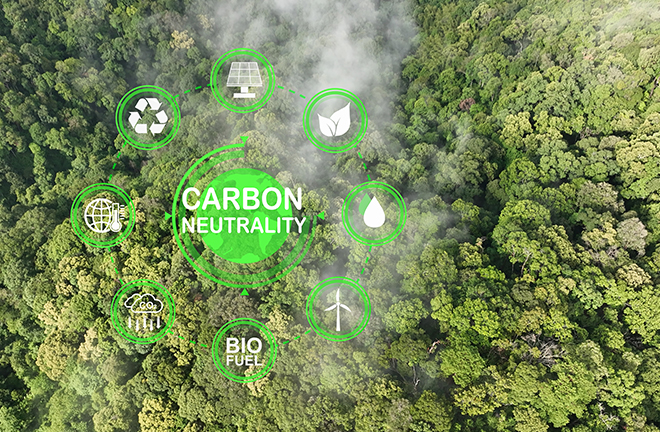China actively promotes carbon neutrality

Carbon neutrality Photo: TUCHONG
In recent years, climate change has become increasingly severe, and greenhouse gas emissions have become a major global challenge. The report to the 20th National Congress of the Communist Party of China explicitly calls for “working actively and prudently towards the goals of reaching peak carbon emissions and carbon neutrality,” and emphasizes the need to “get actively involved in global governance in response to climate change.”
Significance
Carbon neutrality refers to the state where emissions of greenhouse gases due to human activities and the removal of these gases are in balance, achieved either through reduced emissions or increased removal. This state has significant implications for global environmental governance and sustainable development.
First, achieving carbon neutrality can effectively reduce greenhouse gas emissions, mitigate global warming, and reduce the frequency of extreme weather events linked to rising global average temperature, thereby lessening the impact of climate change on human society and the environment. Second, traditional models of economic growth rely on industrial structures characterized by high energy consumption and massive greenhouse gas emissions, placing enormous pressure on the environment. Carbon neutrality entails reducing ecological damage while developing the economy to achieve sustainable development, leaving a beautiful planet for future generations. Third, increasing research, development, and production of clean energy technologies facilitates clean and efficient energy use as well as economic transformation and upgrading. Green industries are thus poised to become pivotal new engines for future economic growth.
Challenges
Global governance of carbon neutrality faces multiple challenges due to considerable differences among countries in terms of technology, policy, awareness, and action.
First, reaching carbon neutrality necessitates developing more efficient and low-carbon clean technologies. This requires increased research investment, enhanced technological innovation, and the commercialization and industrialization of technological advances.
Second, countries should contribute to carbon neutrality by formulating relevant environmental and economic policies. Reducing global greenhouse gas emissions requires implementing a unified international carbon emission trading scheme alongside carbon taxes and establishing multilateral mechanisms for reducing emissions.
Third, substantial investment and large-scale resource allocation are needed to achieve carbon neutrality, which poses substantial challenges for less developed countries. Economic factors such as global trade and energy price fluctuations also exert pressure on global governance of carbon neutrality.
Fourth, reaching carbon neutrality necessitates broad social engagement. Challenges in global governance of carbon neutrality can only be transformed into opportunities when a majority of individuals recognize the serious threat of climate change and adopt green, low-carbon modes of production, lifestyles, and consumer behavior.
Building a beautiful future
China has undertaken extensive practical exploration in the area of carbon neutrality and developed its own solutions to global carbon neutrality governance.
First, China has established a comprehensive “1+N” policy system for reaching peak carbon emissions and carbon neutrality, wherein “1” represents overall guiding principles, and “N” represents industry-specific and sector-specific measures. It has also implemented “ten major initiatives aimed at achieving peak carbon dioxide emissions.”
Second, China continues to increase investment in research, development, and dissemination of green technology. It currently stands as the world’s largest renewable energy market, boasting the world’s largest power supply systems and clean power generation systems. Its new energy vehicle industry is a world leader in terms of scale.
Third, China advocates for joining forces to address global climate and environmental challenges. It actively promotes the building of a community with a shared future for mankind and a green Silk Road. In January 2024 President Xi Jinping reiterated that “it is imperative to accelerate the transition to a model of green development and work toward the goals of reaching carbon peaking and carbon neutrality.”
Yang Hongqiang and Zhang Wenwu are professors from the College of Economics and Management at Nanjing Forestry University.
Edited by WANG YOURAN

 PRINT
PRINT CLOSE
CLOSE